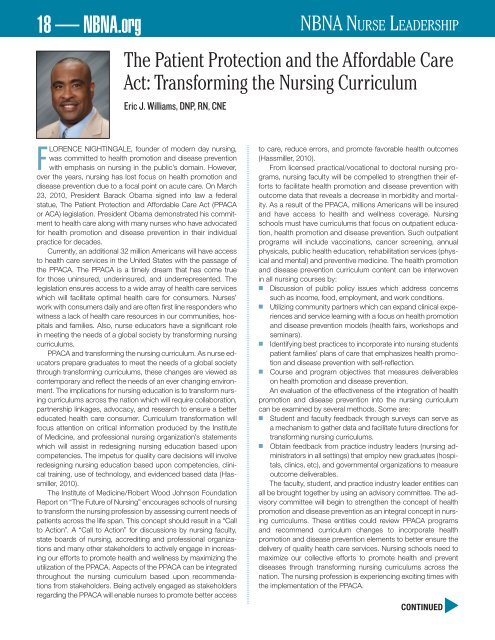NBNA SPECIAL ISSUE ON THE FUTURE OF NURSING
NBNA SPECIAL ISSUE ON THE FUTURE OF NURSING
NBNA SPECIAL ISSUE ON THE FUTURE OF NURSING
Create successful ePaper yourself
Turn your PDF publications into a flip-book with our unique Google optimized e-Paper software.
18 — <strong>NBNA</strong>.org<br />
The Patient Protection and the Affordable Care<br />
Act: Transforming the Nursing Curriculum<br />
Eric J. Williams, DNP, RN, CNE<br />
FloreNce NiGHtiNGAle, founder of modern day nursing,<br />
was committed to health promotion and disease prevention<br />
with emphasis on nursing in the public’s domain. However,<br />
over the years, nursing has lost focus on health promotion and<br />
disease prevention due to a focal point on acute care. on march<br />
23, 2010, President Barack obama signed into law a federal<br />
statue, the Patient Protection and Affordable care Act (PPAcA<br />
or AcA) legislation. President obama demonstrated his commitment<br />
to health care along with many nurses who have advocated<br />
for health promotion and disease prevention in their individual<br />
practice for decades.<br />
currently, an additional 32 million Americans will have access<br />
to health care services in the United states with the passage of<br />
the PPAcA. the PPAcA is a timely dream that has come true<br />
for those uninsured, underinsured, and underrepresented. the<br />
legislation ensures access to a wide array of health care services<br />
which will facilitate optimal health care for consumers. Nurses’<br />
work with consumers daily and are often first line responders who<br />
witness a lack of health care resources in our communities, hospitals<br />
and families. Also, nurse educators have a significant role<br />
in meeting the needs of a global society by transforming nursing<br />
curriculums.<br />
PPAcA and transforming the nursing curriculum. As nurse educators<br />
prepare graduates to meet the needs of a global society<br />
through transforming curriculums, these changes are viewed as<br />
contemporary and reflect the needs of an ever changing environment.<br />
the implications for nursing education is to transform nursing<br />
curriculums across the nation which will require collaboration,<br />
partnership linkages, advocacy, and research to ensure a better<br />
educated health care consumer. curriculum transformation will<br />
focus attention on critical information produced by the institute<br />
of medicine, and professional nursing organization’s statements<br />
which will assist in redesigning nursing education based upon<br />
competencies. the impetus for quality care decisions will involve<br />
redesigning nursing education based upon competencies, clinical<br />
training, use of technology, and evidenced based data (Hassmiller,<br />
2010).<br />
the institute of medicine/robert Wood Johnson foundation<br />
report on “the future of Nursing” encourages schools of nursing<br />
to transform the nursing profession by assessing current needs of<br />
patients across the life span. this concept should result in a “call<br />
to Action”. A “call to Action” for discussions by nursing faculty,<br />
state boards of nursing, accrediting and professional organizations<br />
and many other stakeholders to actively engage in increasing<br />
our efforts to promote health and wellness by maximizing the<br />
utilization of the PPAcA. Aspects of the PPAcA can be integrated<br />
throughout the nursing curriculum based upon recommendations<br />
from stakeholders. Being actively engaged as stakeholders<br />
regarding the PPAcA will enable nurses to promote better access<br />
nBnA nurse LeAdershIp<br />
to care, reduce errors, and promote favorable health outcomes<br />
(Hassmiller, 2010).<br />
from licensed practical/vocational to doctoral nursing programs,<br />
nursing faculty will be compelled to strengthen their efforts<br />
to facilitate health promotion and disease prevention with<br />
outcome data that reveals a decrease in morbidity and mortality.<br />
As a result of the PPAcA, millions Americans will be insured<br />
and have access to health and wellness coverage. Nursing<br />
schools must have curriculums that focus on outpatient education,<br />
health promotion and disease prevention. such outpatient<br />
programs will include vaccinations, cancer screening, annual<br />
physicals, public health education, rehabilitation services (physical<br />
and mental) and preventive medicine. the health promotion<br />
and disease prevention curriculum content can be interwoven<br />
in all nursing courses by:<br />
n Discussion of public policy issues which address concerns<br />
such as income, food, employment, and work conditions.<br />
n Utilizing community partners which can expand clinical experiences<br />
and service learning with a focus on health promotion<br />
and disease prevention models (health fairs, workshops and<br />
seminars).<br />
n identifying best practices to incorporate into nursing students<br />
patient families’ plans of care that emphasizes health promotion<br />
and disease prevention with self-reflection.<br />
n course and program objectives that measures deliverables<br />
on health promotion and disease prevention.<br />
An evaluation of the effectiveness of the integration of health<br />
promotion and disease prevention into the nursing curriculum<br />
can be examined by several methods. some are:<br />
n student and faculty feedback through surveys can serve as<br />
a mechanism to gather data and facilitate future directions for<br />
transforming nursing curriculums.<br />
n obtain feedback from practice industry leaders (nursing administrators<br />
in all settings) that employ new graduates (hospitals,<br />
clinics, etc), and governmental organizations to measure<br />
outcome deliverables.<br />
the faculty, student, and practice industry leader entities can<br />
all be brought together by using an advisory committee. the advisory<br />
committee will begin to strengthen the concept of health<br />
promotion and disease prevention as an integral concept in nursing<br />
curriculums. these entities could review PPAcA programs<br />
and recommend curriculum changes to incorporate health<br />
promotion and disease prevention elements to better ensure the<br />
delivery of quality health care services. Nursing schools need to<br />
maximize our collective efforts to promote health and prevent<br />
diseases through transforming nursing curriculums across the<br />
nation. the nursing profession is experiencing exciting times with<br />
the implementation of the PPAcA.<br />
coNtiNUeD


